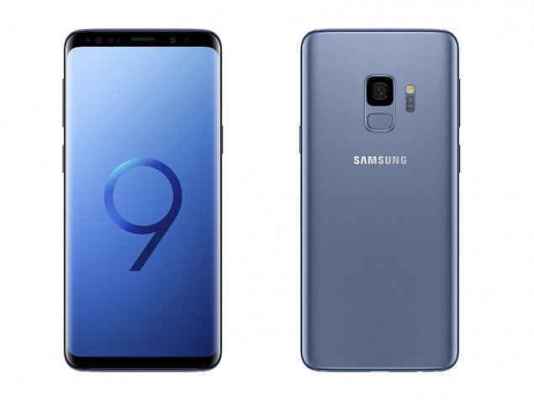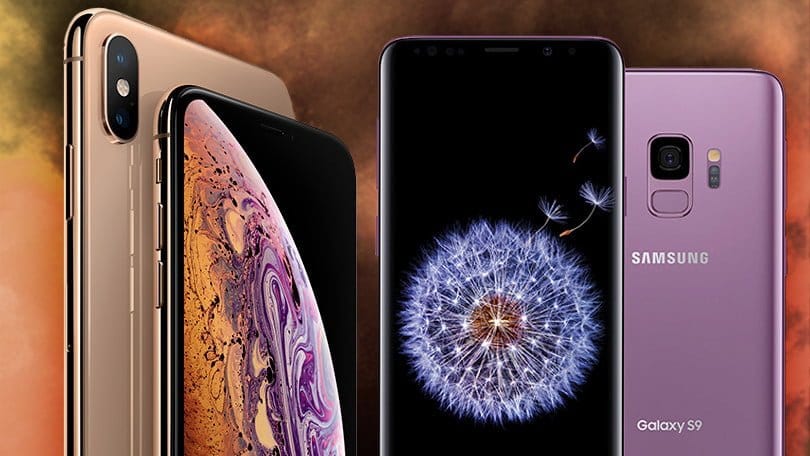iPhone XS VS Samsung Galaxy S9 – Battle For Performance & Camera – Finally, as the iPhone XS is here, it will be good to start comparing it with the latest flagship device around. The Samsung Galaxy S9 is of the smartphone that will compete with iPhone XS. Here you will notice some similarities between the iPhone XS and the Samsung Galaxy S9.


iPhone XS VS Samsung Galaxy S9 – Design
On the design, both phones are just the upgraded version of their predecessor. None of them comes with an original design. The Galaxy S9 measures 147.7 x 68.7 x 8.5mm similar to that of iPhone XS. The only difference here is that the iPhone XS is slightly bigger in wide. It measures .6 x 70.9 x 7.7mm.
The Samsung Galaxy S9 is built with an aluminum frame with glass as well, while the iPhone XS features a glass front and back and a stainless steel frame. The Aluminium material on the Galaxy S9 reduces the weight of the phone to 163g, just a hair less than the 177g iPhone XS. In all, both phones are premium devices, and they are built with glass and metal which will ensure durability.
Both also have dust and water resistant rating of IP68. The Samsung Galaxy S9 is equipped with a corning gorilla glass 5 to prevent the phone from crack and scratch, while Apple claims that the iPhone XS is built with the most durable glass ever in a smartphone.
Where the Samsung Galaxy S9 has an edge over the iPhone XS is the USB-C port, a 3.5mm headphone jack, and a microSD card slot.
The iPhone XS only support a wireless headphone, or you can use the Lightning Connector at the bottom of the phone. You will find a notch on the front of the iPhone XS which houses the front camera while Samsung Galaxy S9 doesn’t have a notch.
The iPhone XS support Face ID using the front camera, while the Samsung Galaxy S9 support iris scanning and facial recognition on the front camera. Finally, Samsung Galaxy S9 has a fingerprint scanner something you won’t find on the iPhone XS.
iPhone XS VS Samsung Galaxy S9 – Display
Both the Samsung Galaxy S9 and the iPhone XS has a similar display. They both have 5.8-inch OLED panels, though Samsung’s is Super AMOLED. And the Samsung Galaxy S9 has an impressive 2,960 x 1,440 resolution, which gives it an incredibly dense 570ppi. The iPhone XS has 2,436 x 1,125 for 458ppi. Samsung has a bigger pixel display, while the iPhone XS has a broader HDR support with a 60% increase in dynamic range.
The Samsung Galaxy S9 is capable of HDR content, but it doesn’t support Dolby Vision, while the iPhone XS does support Dolby Vision as well as HDR10. Though they have some differences in the display features, however, you will hardly notice any difference in real life, because they will both offer great contrast ratios. The only noticeable thing in the phones is the iPhone XS notch and Samsung’s elegantly curved display along the sides.
iPhone XS VS Samsung Galaxy S9 – Camera
On paper, the iPhone XS has a dual sensor system on the back with a 12MP, f/1.8 wide-angle camera, and a 12MP, f/2.4 telephoto camera. The primary sensor support 2x optical zoom with both having optical image stabilization and Quad-LED True Tone flash paired with the sensors. It’s capable of 4K video at up to 60fps and 1080p slo-mo at up to 240fps.
The Samsung Galaxy S9 also has a similar dual camera setup. It has dual 12MP with optical image stabilization and Samsung equipped it with a sensor that will allow you to change aperture between a fast f/1.5 and f/2.4. For video shooting, the Samsung Galaxy S9 offers the same 4K video recording resolution. On the front, the Samsung Galaxy S9 has a front facing camera of 8MP with a wide f/1.7 aperture. This will perform better than the 7MP, f/2.2 front-facing camera on the iPhone XS.
iPhone XS VS Samsung Galaxy S9 – Performance
On the hardware, both phones are an entirely different thing. The iPhone XS is running in iOS 12 on Apple’s A12 Bionic chipset, which introduces the Neural Engine for some advanced photography, video, and image processing. As for the Samsung Galaxy S9, it runs on Android 8.0 Oreo out of the box which can be upgraded to the latest version of Android 9.0 Pie.
It has Snapdragon 845 chipset, which is great, but Apple has been showing the superior power of its custom chipsets, the A12 Bionic and the Neural Engine on iPhone XS is likely going to give it the edge in AR applications. Both phones will run fast, and they will perform well and handle multitasking smoothly.
iPhone XS VS Samsung Galaxy S9 – Battery & Storage
Both phones come with average battery capacity. The Samsung Galaxy S9 has a nonremovable battery capacity of 3000mAh while the iPhone XS comes with 2800mAh. The Samsung Galaxy S9 will slightly last longer than the iPhone X. With the powerful chipset and the sharp display, both phones will last up to 24 hours when fully charged.
Both also support wireless charging, with the Galaxy S9 coming with a fast charger out of the box, while the iPhone XS doesn’t. On the storage, both have a variant with 64GB, while the Samsung Galaxy S9 stop at 256GB, and the iPhone XS extend up to 512GB. The good news here is that you can further expand the Samsung Galaxy S9 with micro SD card.
The Samsung Galaxy S9 has Bixby and the option of Google Assistant, while the iPhone XS has Apple’s Siri virtual assistant. Where the Samsung Galaxy S9 is leading is the ability to use the phone as a portable computer. You can use the Dex pad, connect it to a keyboard, mouse and external monitor and run the phone as an Android-based computer. With this single feature, the Samsung Galaxy S9 has the final point.
[amazon box=”B079H6RLKQ,B07DLCG28H,B07BBVQVCH,B07C65MFKH,B07B8KLQ96″ template=”list”] store=’TechVaz-20′ marketplace=’US’ link_id=’33bdb8eb-b9de-11e8-880d-81c035a3eca8′]
iPhone XS VS Samsung Galaxy S9 – Price
The iPhone XS price starts from $999 to $1,349 depending on the storage model you want, while the Samsung Galaxy S9 starting from $719 to $1,199.

